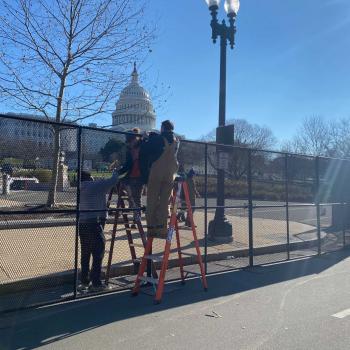Protestants have a long history of resisting tyrannical governments. It was partly a function of disobedience to the papacy, though truth be told Roman Catholic bishops had their own long history of seeking the freedom of the church from oppressive civil magistrates. Here’s a simple way of defining the idea from Mark David Hall:
Within a generation of Calvin, virtually every reformed civil and ecclesiastical leader was convinced that the Bible taught that governments should be limited, that they should be based on the consent of the governed, that rulers should promote the common good and the Christian faith, and that unjust or ungodly rulers should be resisted or even overthrown.
What might this outlook mean for Christians complying with government orders to stay home and wash hands often? On the one hand, protecting public health is part of serving the common good. On the other hand, governments prohibiting worship violates limited government. Let’s not even go there to whether the governor of New York or POTUS is a godly ruler.
Kyle Borg breaks down the dilemma for Christians living under coronavirus restrictions this way, either obedience to just law or disobedience as a way of obeying God:
We need to be careful because if what the government is doing is lawful then to resist them is to resist God: “For there is no authority except from God, and those that exist have been instituted by God. Therefore whoever resists the authorities resists what God has appointed, and those who resist will incur judgment” (Romans 13:1-2). Yes, God is that serious about respecting and submitting to our governing authorities. On the other hand, if what the government is doing isn’t lawful then as Christians we have no choice: “We must obey God rather than men” (Acts 5:29).
That means, for practical purposes, the church cannot dictate to the state:
Biblically speaking, church and state are distinct but equal and cooperating authorities under the Lord Jesus Christ — the state is not over the church and the church is not over the state. We need to respect that distinction. It’s a point that’s been confused by American civil-religion but the church isn’t a political party, policy maker, lobbyist organization, or an institution of checks-and-balances for the civil government.
It also means, that if the state passes laws that require Christians to sin, disobedience is in order:
There are times when as Christians we need to disobey our governing authorities (see Acts 5:29). But it is only when they require us to be disobedient to God — when the only way we can obey them is to be unfaithful to God. For the Christian, civil disobedience doesn’t arise out of patriotic flag waving while holding the Bill of Rights; it doesn’t arise out of anti-government sentiment or political leanings; it doesn’t arise because we’re inconvenienced by the law or draconian measures.
But an important factor in between the Christian and God or between the believer and the government is lesser civil authorities. Calvin and other theologians who mentioned the possibility of resistance made sure to qualify that. Citizens themselves could not resist lawfully. They needed to have other parts of the government lead such insurrection. Modern government has this mechanism of resistance baked in through the system of checks and balances. In other words, a legislature can check an governor or president who overreaches legitimate authority.
Borg puts it this way by referring to the judicial branch of government:
We’re a nation and states that are governed within the parameters of a constitution. It could be that the restrictions on public gatherings as applied to religious assemblies is unconstitutional. Personally, I expect challenges to be made in the judicial courts which is the appropriate place for those challenges to be made (see Acts 25:10-12) — not the court of public opinion. But the unconstitutionality of a law is not the same thing as an unbiblical law.
But Congress or a state legislature also has authority to restrain the executive. This is what some call for in the case of Governor Whitmer’s policy in Michigan:
Among those who think Whitmer has gone too far, the next question pertains to the appropriate response. Some will leave it to social media posts. Others now circulate a petition seeking to recall her from office.
Their best answer resides in another part of Michigan’s government: the Legislature. Leaders in the Michigan Legislature have criticized the new order, including Speaker of the House Lee Chatfield and Senate Majority Leader Mike Shirkey. Moreover, members of both chambers already intervened individually to modify aspects of past orders. As a legislative body, they have power to do much more if they so choose.
Michigan’s constitution, like our national one and those of most other states, distributes its power among three branches — a Legislature, governor and courts. The relationship between those branches stems from the relationship between the powers our constitution gives them. . . .
As the source of Whitmer’s executive power, [lawmakers] possess the capacity to redirect it. They can amend the statutes on which the governor bases her actions. More to the point now, they could pass legislation that amends the current executive order to align with what they think best for the health — physically and economically — of the state of Michigan. Perhaps better lines can be drawn between essential and non-essential workers. Or maybe reasonable deviations between hot spots and other regions in the state could work.
The lesson apparently is if you protest at the state capital, make sure you wear a mask and are six feet from the other protesters. Otherwise, call your legislator. He or she has power to resist a governor who has gotten in over his or her head.















